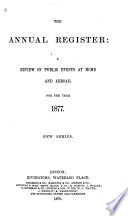 | 1872 - 802 lehte
...neutralization of the Black Sea. " This unanimity furnishes n striking proof that the Powers recognize that it is an essential principle of the law of nations that none of them can liberate itself from the engagements of a treaty, nor modify the stipulations thereof,... | |
 | Edmund Burke - 1878 - 650 lehte
...Plenipotentiary, in common with those of the other Powers, signed a Declaration affirming it to be " an essential principle of the law of nations that no Power can liberate itself from the engagements of a Treaty, nor modify the stipulations thereof, unless with... | |
 | Cassell, ltd - 1865 - 702 lehte
...the words of the protocol of the day's proceedings, the plenipotentiaries there assembled " recognise that it is an essential principle of the law of nations, that no Power can liberate iteelf from the engagements of a treaty, nor»modify the stipulations thereof, unless with... | |
 | Edmund Ollier - 1871 - 606 lehte
...was abrogated. At the first meeting of the Conference a protocol was agreed to, recording it to be an essential principle of the law of nations that no Power can liberate itself from the engagements of a Treaty without the consent of the other contracting parties.... | |
 | Edmund Burke - 1872 - 814 lehte
...neutralization of the Black Sea. " This unanimity furnishes a striking proof that the Powers recognize that it is an essential principle of the law of nations that none of them can liberate itself from the engagements of a treaty, nor modify the stipulations thereof,... | |
 | Association for the Reform and Codification of the Law of Nations. Conference - 1875 - 888 lehte
...of 1856 provides for mediation and advises arbitration ; and the London Convention of 1871 declared that ' it is an essential principle of the Law of Nations that no power can release itself from the engagements of a treaty, nor modify any of its stipulations, save with the assent of the contracting... | |
 | United States. Department of State - 1875 - 760 lehte
...more recent date than that of Paris— he meant the conference of 1871, which was to this effect : " That it is an essential principle of the law of nations that no power can liberate itself from the engagements of a treaty, nor modify the stipulations thereof, uuless with... | |
 | 1875 - 526 lehte
...projectiles in warfare. The Conferences of London of 1871. The recognition of the respective Powers that it is an essential principle of the Law of Nations, that no Power can liberate itself from the engagements of a treaty without the consent of the other contracting Powers.... | |
 | Sir Travers Twiss - 1875 - 690 lehte
...AustriaHungary, of Great Britain, of Italy, of Russia, and of Turkey, assembled to-day in Conference, recognize that it is an essential principle of the law of nations that no Power cau liberate itself from the engagements of a Treaty, nor modify the stipulations thereof, unless with... | |
 | 1875 - 192 lehte
...obligations of treaties cannot be repudiated at pleasure, and that no one of the contracting Powers can release itself from the obligations of a treaty, or modify its stipulations, however old these may be, save by and ivith the consent of the contracting parties. Neither can any... | |
| |